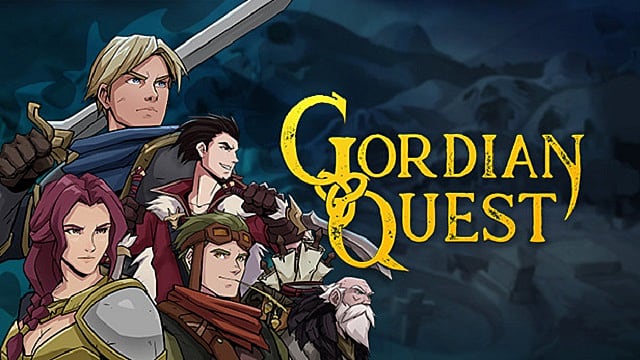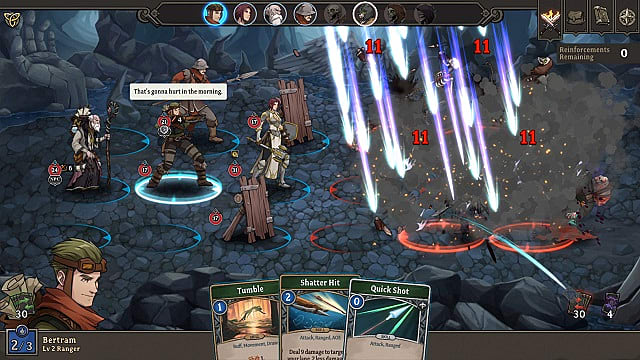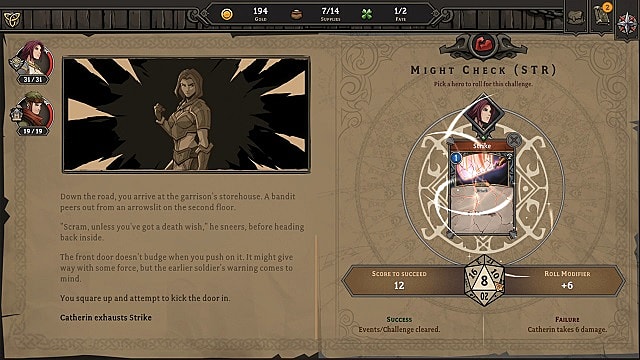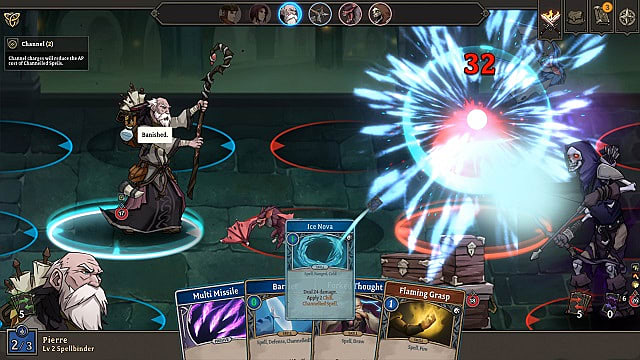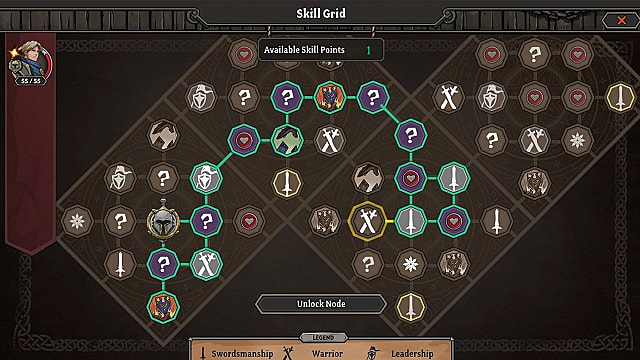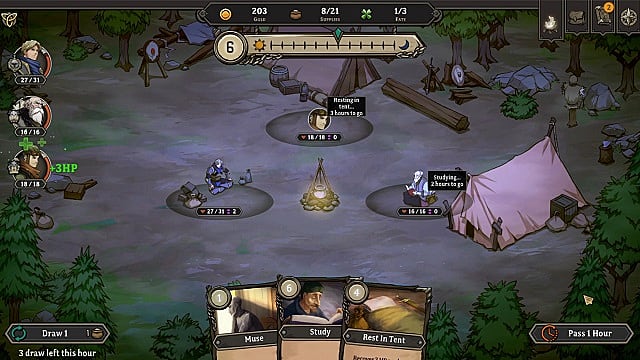This is the gameplay pattern in Gordian Quest, a roguelike that draws elements from several indie darlings and smashes them all together into something new but wholly familiar.
Gordian Quest Early Access Review: A Tactical Kitchen Sink
Gordian Quest immediately calls to mind Slay the Spire and Darkest Dungeon. You control a small handful of lovable weirdos, each with their own special abilities and talents that change and evolve through gameplay. Rather than choosing from a narrow pool of attacks, however, each character also has a deck of cards that contain their attacks, buffs, and passive abilities.
You customize these decks as each character levels up, adding stronger abilities and removing weaker ones until you, hopefully, have a series of powerful combinations.
The game then throws your heroes into a series of missions surrounding an area that needs your help. The missions come at you in the same order each time: secure the perimeter, recruit some new heroes, recover the blacksmith’s tools, etc. Each battle is procedurally generated, however, and you’ll take on different enemies and see different layouts during each run.
You can also manipulate the difficulty to make things truly tough — permadeath and a quick run restart if you lose a hero or two early — or scale things back if you want to survive to see what later missions have to offer.
Planning Ahead
One thing is certain: You’ll need a plan after you start figuring out the game’s quirks. If you randomly equip items and add cards to your heroes’ decks, you’re going to get slaughtered after the first few missions. Enemies are ruthless and capable of inflicting all sorts of nasty status effects, and specializing your heroes seems to be the only way to find much success.
I usually built up one hero to tank in the front row and two heroes behind them to deal damage: one with constant, solid damage and one that could build up buffs and critical hits and unleash them all at once.
When it all comes together, it is extremely empowering. You’ll move your cursor over an enemy after a few rounds of playing cards and moving your heroes around the battlefield and discover that you can kill them in a single, powerful attack.
When it fails, though, boy, does it fail. You’ll pull three passive abilities and a couple of block cards on a single turn and realize there is little you can do to stop the onslaught. Losing feels like a combination of your own bad planning and a bit of bad luck. Sure, you drew that crummy hand right when you needed something good, but who put that many passive cards together in the same hero deck? And why didn’t you take the time and resources to heal up before this battle?
Common Fantasy
The storyline in Gordian Quest is pretty standard “Heroes battle the forces of evil” type stuff. The six heroes available at launch are pretty standard fare, too. There’s the smirking rogue, the armor-clad paladin, the old-man wizard. After one or two times of starting a run from scratch, you’ll probably get really sick of clicking through the dialogue that begins each new wrinkle in the story.
Luckily, you can click through it in a hurry.
One interesting facet that Gordian Quest adds to its gameplay is a bit of influence from tabletop roleplaying. Each character has ability stats in a few areas: strength, intelligence, and dexterity. Occasionally, you’ll receive a stat check option, such as avoiding a trap or forcing open a door. You’ll pick the hero best suited for the options available, roll a virtual d20, add that character’s bonus, and either achieve a successful outcome or not.
Depending on the roll, you may receive bonuses or penalties. It helps to customize the story and make you think about which characters will join you on each mission.
Tricky Tactics
The core of Gordian Quest is the combat, however. It’s actually much more complex than it initially seems, but here are the basics.
Your heroes are on one side and your enemies on the other. Each side is laid out like a grid, and certain attacks have range limits or special properties based on where your heroes are currently standing. Characters play their actions out in initiative order, with each playing their full turn before passing to the next. You’ll pull a handful of cards each turn, with an “Action Point” cost for each, and you’ll choose which you want to play and watch the chaos ensue. Then it’s pass to the next character.
There are a lot of elements to combat that are not very intuitive, however. Status effects are extremely small icons next to your character, and they aren’t always explained in the best detail when you hover your cursor over them. Especially when a battle goes for an extended number of rounds, you’ll often miss a small thing here or there, often with catastrophic results.
It can be outrageously frustrating when you reach a crucial round of a boss fight, lay out your perfect string of abilities, then watch your hero die because you didn’t notice a tiny icon indicating a defense buff on the enemy.
Developer Mixed Realms has pushed out several updates since Gordian Quest’s initial release, fixing small things and tweaking elements of gameplay. While this is hopefully pushing things in the right direction, it has also made it extremely difficult to keep track of how certain elements of the game work.
Hopefully, they’ve found a solid baseline now that the game has been out for a few days and balance issues will be tweaked in larger patches.
Gordian Quest Early Access Review — The Bottom Line
Gordian Quest has a lot of good elements to it. The tactical battles are complex and high stakes. Tons of different mechanics are working together, giving you a serious advantage if you’re able to juggle lots of small elements in your head and see the bigger picture.
The roguelike elements also add a tense bit of randomness to loot drops and enemy compositions, helping the game feel adaptive in the same way that a DM in a tabletop RPG would, not to mention the elements where you actually roll dice to determine outcomes.
All that said, Gordian Quest also doesn’t really manage to do anything better than similar games. If you love the random nature of loot and the brutal tactics of enemies, it’s hard to recommend it over Darkest Dungeon. If you love slowly building an attack deck into a lean, mean combo machine, Slay the Spire offers more paths to success and a better feeling of fulfillment when it all comes together.
Essentially, if you’ve exhausted your time with games in similar genres and need a new fix, Gordian Quest is exactly what you need. If you’ve still been sitting on some of those greats, you should probably start there.
[Note: A copy of Gordian Quest was provided by Mixed Realms for the purpose of this early access impressions piece.]
